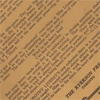MÄNNERBUND – ТЕОРИЈА И РЕАЛНОСТ У НЕМАЧКОЈ ПОЧЕТКОМ 20. ВЕКА
MÄNNERBUND – THEORY AND REALITY IN GERMANY AT THE BEGINNING OF 20. CENTURY
Author(s): Aleksandar MolnarSubject(s): Military history, Political history, Social history, Politics and society, Evaluation research, Pre-WW I & WW I (1900 -1919)
Published by: Српско социолошко друштво
Keywords: society; community; Männerbund (union of men); revolution; rat; social sciences;
Summary/Abstract: In the article the author is dealing with the connection between the renaissance of the unions of men (Männerbünde) and rise of scientific interest in such forms of social life in the early 20th Century Germany. Although new forms of Männerbünde were not entirely adequate to the old forms, there is no doubt that all main features of militant Männerbünde were present at the beginning of Weimar republic: the cult of youth, ecstatic experiences, elitist conciseness, as well as tendency towards open and rough violence. Author‘s intention is to stress the importance of the role that Männerbünde played in the early phase of German revolution – especially in provoking civil war, spreading hatred towards modern (i.e. “Western”) civilisation, reviving old militant German traditions, fighting democracy and umdermining the fragile foundations of Weimar republic.
Journal: Социолошки преглед
- Issue Year: 40/2006
- Issue No: 1
- Page Range: 81-92
- Page Count: 12
- Language: Serbian

